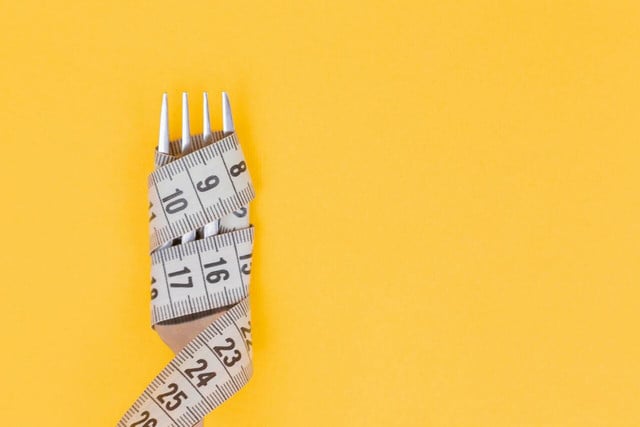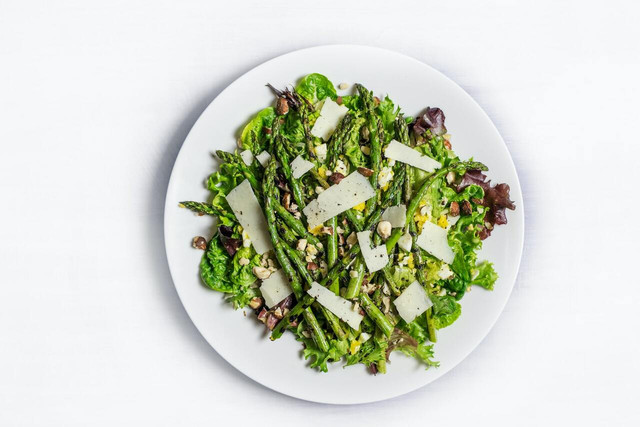Learning about the ten principles of intuitive eating can help you restore your relationship with food. If you’re tired of fad diets and/or struggle to stick to a healthy eating routine, intuitive eating might be for you.
Intuitive eating may sound like just another fad diet — or maybe something which gives you an “excuse” to eat whatever you want — but neither is the case. Healthy attitudes towards the self and food are at the core of this dietary philosophy.
Read further to learn about intuitive eating and its 10 principles.
What Is Intuitive Eating?

(Foto: CC0 / Unsplash / Diana Polekhina)
Intuitive eating was developed by registered dietitians Elyse Resch and Evelyn Tribole as a way for people to heal their relationship with food. It also purported to be suited for anyone who’s struggled with ineffective diets and negative self-perceptions stemming from diet culture.
It addresses the pressure put onto people by society to fit within a small box: how we should look, what size we should be, and how different body parts may be too small, too big, or the wrong shape. This is in addition to other dangerous misconceptions, like that eating meat is masculine, while being vegan isn’t.
Intentional weight loss can often have negative side effects and many diets don’t result in the outcomes envisioned. Indeed, dieting can result in disordered eating.
Also interesting: The Signs of Emotional Eating & How to Stop
To give an alternative to the sometimes scary world of dieting, intuitive eating offers an alternative practice that promotes the devaluing of different kinds of food to reduce feelings of guilt and make ourselves have more positive images of ourselves.
To its supporters, intuitive eating means understanding more about how your body feels, what it’s telling you to eat and not to eat, when, how much, etc. Intuitive eating is anti-diet and allows the person to make their own rules about how to go about their consumption to develop healthier habits.
Keep reading to learn about the ten principles of intuitive eating.
Principle 1: Reject Diet Mentality
A diet mentality is a perspective of how nearly all decisions are related to your diet. This may seep into different aspects of life, such as deciding not to join friends for a meal because it would mean breaking the rules of your diet.
Another example is the idea of “cheating” when on a diet. Because diets require very black-and-white thinking, this mindset creates a dichotomy in your mind where the food you aren’t allowed to have begins to become even more appealing. Diet mentality is also the reason one decides to diet, which is often for superficial purposes.
By rejecting a diet mentality, intuitive eating rejects the idea that the less fat you have the better, or that there is one ‘right’ or ‘good’ way of eating. Food and eating is now about how to be happy and healthy, instead of how to be skinny and pretty.
The first principle of intuitive eating recognizes the damage that dieting creates physically and mentally.
Principle 2: Eat When You’re Hungry



(Foto: CC0 / Pixabay / JillWellington)
This might sound simple, but many people still find it difficult to follow. When you’re accustomed to dieting for many years, it’s not uncommon to acquire the practice of ignoring hunger for some time, especially when counting calories or limiting food intake in some other way.
This principle wants you to instead acknowledge your hunger because cravings and hunger can give us information about what our bodies may need. This idea instead says to listen to your body and that it’s okay to eat. If your body is telling you it’s hungry, it’s best to listen to it — even if you already ate a meal only an hour ago.
You might be thinking that if you should just eat whatever you feel like all the time, you’d turn to fast food and sweets much too often. But in fact, various studies suggest that the opposite happens: Intuitive eaters eat a more varied diet and consume more fruits and vegetables. Exemplary of this is a longitudinal cohort study from 2021 that measured how much almost 2000 participants adhered to the principles of intuitive eating. Through a questionnaire, the researchers then found that the people who adhered to the principles most ate about half a serving more of vegetables each day.
The explanation proponents of intuitive eating offer: Once you stop seeing certain foods as ‘taboo’ — and therefore even more enticing — you’ll learn how to listen to your body. Practitioners often claim that they simply don’t feel like eating unhealthy foods most of the time, and rather crave fresh fruit or veggies instead.
What those studies haven’t shown is a causation: Do people eat more veggies because they believe in the principles of intuitive eating? Or do they eat more intuitively because they happen to like the taste of paprika and apples, and therefore have to ‘watch’ their food intake less?
Principle of Intuitive Eating 3: Challenge the “Food Police”



(Foto: CC0 / Pixabay / pasja1000)
Intuitive eating identifies the “food police” as any voice which attempts to police our eating habits. It may come from inside our own heads, from friends or parents, or even a YouTube or Instagram personality. The food police say which food is “good” and which food is “bad,” but the important part of this principle is to challenge these conceptions.
This helps to challenge your own thinking surrounding food and allows you to find out where certain rules come from and whether they work for you or not.
Principle 4: Pay Attention to Fullness



(Foto: CC0 / Pixabay / Pexels)
For anyone who’s spent many years dieting, you may have restricted yourself from feeling full or seen it as a bad feeling. Intuitive eating wants to alter this association of fullness with guilt. This principle of intuitive eating allows you to tune into yourself to recognize your fullness. This can help prevent overeating but also ensure you’re getting the right amount of food.
If you feel that you might actually be eating too much and have issues recognizing your fullness, our guide on the topic might help you: 4 Signs and 7 Solutions for Eating Too Much
Principle 5: Make Peace With Food



(Foto: CC0 / Pixabay / Myriams-Fotos)
The fifth principle of intuitive eating is to make peace with food, which can help develop the perception of food as energy that our bodies rely on. It gives us permission to eat whatever we want without regret or guilt.
Coming to the realization that there are no good or bad foods can help reduce binge-eating. And there’s science behind it: Restraining ourselves in regard to food tends to induce binge-eating. When people don’t allow themselves to eat simply because they are hungry, they often eat more and more out of a bad mood and a craving — rather than a real bodily need. And the mood is usually even worse after binging.
Principle 6: Love Your Body



(Foto: CC0 / Unsplash / De'Andre Bush)
Intuitive eating acknowledges that media tends to encourage you to compare yourself to others in order to make you a better consumer. Instagram, TikTok, and the internet in general place advertisements in all nooks and crannies which enable many of us to envy celebrities or each other and can encourage negative self-perceptions.
Intuitive eating acknowledges these struggles and encourages practicing gratitude and body mindfulness. Practicing self-care and body positivity can improve mood, reduce anxiety, and lessen depression symptoms.
Also read: The Harmful Effects of Negative Self-Talk & How to Stop It
Principle of Intuitive Eating 7: Take Care of Yourself
Another principle of intuitive eating is to practice gentle nutrition. This allows you to ease into it without setting too high of expectations so you can maintain these practices longer.
Although intuitive eating may sound like a free pass to eat whatever you want whenever you want, this principle supports the reality of nutrition and health because intuitive eating only works if you’re honest with yourself about what is best for your body.
Though intuitive eating doesn’t sound like it’s putting nutrition first, this principle also supports incorporating a diverse and healthful diet.
Principle 8: Discover the Satisfaction Factor



(Foto: CC0 / Unsplash / Carly Jayne)
In intuitive eating, finding food that satisfies you is an important principle: after all, food is associated with happiness in this framework. The idea behind it: Eating for satisfaction makes eating an inviting and fulfilling experience, and you’ll feel good after it. Moreover, you’ll find it less easy to know how much exactly your body needs and when you’ve had enough.
Despite what diet culture may tell you, there’s a way to feel satisfied with your food without going overboard.
Principle 9: Cope With Your Emotions With Kindness — Not Food



(Foto: CC0 / Unsplash/ Tim Gouw)
Don’t blame yourself for using food as a coping method for negative emotions: It’s a learning process. But finding more suitable and healthier ways of coping with emotional troubles will likely help you recognize that you don’t need to be eating in those situations. In fact, food won’t help resolve any of those issues. Learn how to deal with negative emotions through mindfulness, meditation or journaling, for example, and let eating be an experience of pure enjoyment, not a mindless reaction to bad things happening.
Not sure how to get into mindfulness and meditation? Check out our guide on mindfulness-based stress reduction, or practice mindful walking. Our six best meditation apps will help you get into it.
Other resources you might find helpful for this:
- Metta Meditation for Forgiveness & Self-love
- Tummo Meditation: Learn the “Inner Fire” Breathing Technique
- 12 Different Types of Journals for Staying Mindful
- Emotional Resilience: Training Yourself to Cope
Principle of Intuitive Eating 10: Practice Joyful Movement



(Foto: CC0 / Pixabay / Pexels)
Instead of using exercise as a means to lose weight, when practicing intuitive eating, exercise is a tool to feel good and have fun. Pick activities that you like that leave you feeling good instead of exercise you’d choose only for healthy and vanity reasons.
Our guides might help you find something that’s up your alley:
- 8 Yoga Alternatives for Mindful Exercise
- What Slow Jogging Is & Why It Might be Good for You
- 7 Benefits of Walking You Should Not Miss Out On
- Is the Joy Workout a Real Thing? What You Can Expect
Is There Scientific Support for the Principles of Intuitive Eating?
Still unsure of if this dietary philosophy is just another fad or if it’s really onto something? A literature review analyzed twenty-six clinical and cross-sectional survey studies on intuitive eating. They found that intuitive eating is associated with a lower BMI, psychological health and better eating habits.
There is also other research that suggests intuitive eating could be a healthy solution for people who struggle with eating disorders, which backs up what the dietician creators of this ideology state.
Read more:
- Fasting 16 Hours a Day to Boost Your Health
- 4 Signs and 7 Solutions for Eating Too Much
- Balanced Meal Tips: 10 Rules for a Healthy Diet
Important Information regarding Health-related Topics.
** Links to retailers marked with ** or underlined orange are partially partner links: If you buy here, you actively support Utopia.org, because we will receive a small part of the sales proceeds. More info.Do you like this post?







